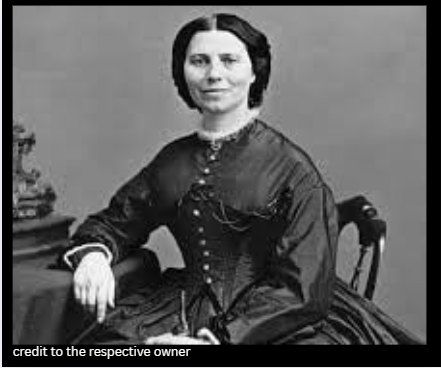An educator and humanitarian, Clara Barton helped distribute essential supplies to the Union Army during the Civil War and later founded the disaster relief organization known as the American Red Cross.
Born on December 25, 1821, in Oxford, Massachusetts, Barton was the youngest of five children of Stephen and Sarah Barton. Her father was a prosperous farmer. As a teenager, she cared for her seriously ill brother David, which was her first experience as a nurse.
Barton’s family encouraged their painfully shy daughter to become a teacher, following the advice of renowned phrenologist L.N. Fowler, who had examined her as a girl. She began teaching at 18, founded a school for workers’ children at her brother’s mill at 24, and after moving to Bordentown, New Jersey, opened the town’s first free school in 1852. She resigned when she discovered the school had hired a man at twice her salary, declaring she would never work for less pay than a man.
In 1854, Barton was hired as a recording clerk at the US Patent Office in Washington, DC, becoming the first woman appointed to such a post. She earned $1,400 annually, equal to her male colleagues. However, the next year, Secretary of the Interior Robert McClelland, who opposed women working in government, demoted her to copyist with a lower salary. In 1857, the Buchanan Administration eliminated her position altogether, but after Abraham Lincoln’s election, she returned as a copyist in 1860.
When the Civil War broke out in 1861, Barton quit her job and dedicated herself to delivering supplies to Union soldiers in need, including men from the 6th Massachusetts Infantry. This marked the start of her lifelong mission to help people during times of conflict and disaster. In 1862, she gained official permission to transport supplies to battlefields and was present at every major battle in Maryland, Virginia, and South Carolina. There, she also cared for the wounded and became known as the “angel of the battlefield.” Though she had no formal medical training, she was named head nurse for one of General Benjamin Butler’s units in 1864. She also worked with Frances Gage to prepare former slaves for life in freedom. After the war, Barton helped locate missing soldiers, marked thousands of graves, and testified before Congress about her wartime experiences.
In 1869, Barton traveled through Europe to regain her health. While in Switzerland, she learned about the International Red Cross, founded in Geneva in 1864. Upon returning to the US, she promoted the creation of an American Red Cross by writing pamphlets, giving lectures, and meeting with President Rutherford B. Hayes. On May 21, 1881, the American Association of the Red Cross was established, and Barton was elected president the following June. In 1882, the US officially joined the International Red Cross.
Barton stayed with the Red Cross until 1904, attending national and international meetings, assisting with disasters, supporting the homeless and poor, and writing about her life and the organization. She was also a passionate advocate for women’s suffrage. In 1904, she founded the National First Aid Association of America, focused on emergency preparedness and developing first aid kits. Her home in Glen Echo, Maryland, became a National Historic Site in 1975, the first dedicated to a woman’s achievements.
